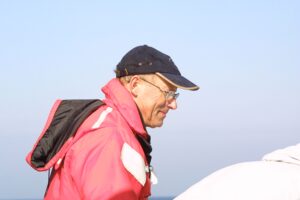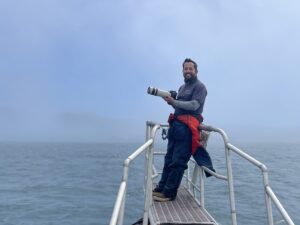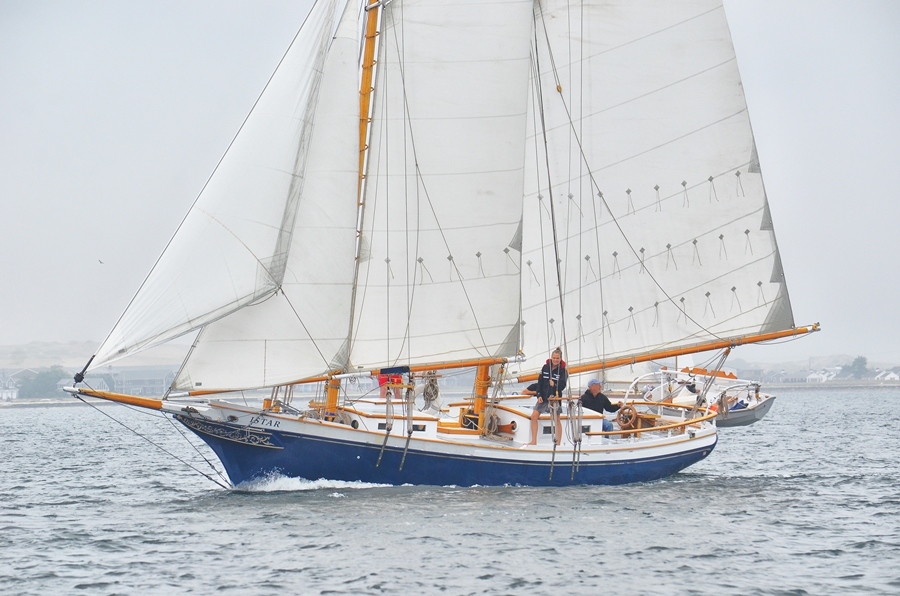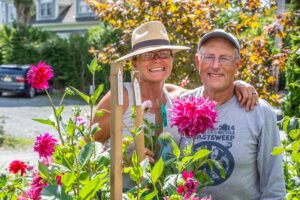PROVINCETOWN — The Center for Coastal Studies is set to announce that Charles “Stormy” Mayo III, a cofounder of the organization and director of its Right Whale Ecology Program, will retire in May. Daniel Palacios, an endowed associate professor in whale habitats in Oregon State University’s Dept. of Fisheries, Wildlife, and Conservation Sciences, will succeed Mayo as director.

“I think it’s time for new blood,” Mayo said. “Someone who really wants to manage this multifaceted effort and add whole new things.”
Mayo, alongside his then-wife Barbara Shuler Mayo and scientist Graham Giese, founded the Center for Coastal Studies in 1976. They wanted to create an organization to study ocean science on the Outer Cape, though it was little more than “a tiny group of volunteers” at first, Mayo said.
In those early days, Mayo said, “I did relatively little. They carried the water.” Then, in the mid-1980s, Giese left CCS to pursue work elsewhere, and Barbara Mayo was diagnosed with breast cancer. She died in 1988. Stormy Mayo was left in charge of most of the center’s operations.
Mayo and his assistant, Carole Carlson, came upon the first known winter right whale in Cape Cod Bay in 1986, revealing that the bay is an important winter feeding ground for this extremely rare mammal.
Since that sighting, right whales have become a focus of the center’s work, and Mayo has been in charge of studying them. Under his leadership, CSS undertook an ongoing 38-year-long right whale survey that has shed light on the whales’ habitat requirements, seasonal movement patterns, and dietary requirements in the bay.
The research has led to passage of strict conservation laws covering Cape Cod Bay and prompted the creation of the Stellwagen Bank National Marine Sanctuary, Mayo said.

Mayo has also saved whales directly through the center’s disentanglement program. Before CCS established its program, only one similar effort existed. It was in Newfoundland and focused on whales that were so wrapped up in fishing gear they couldn’t move. Mayo’s sought to help whales that were partially entangled, which meant chasing them down and untangling them as they struggled. That made the CSS program “somewhat of a revolutionary thing,” Mayo said.
Thanks to the center’s work studying and disentangling these whales, “some unknown number of right whales are probably alive that would have been killed,” Mayo said.
The Center for Coastal Studies now has 14 programs that cover everything from shark ecology to seafloor mapping. And it has become a renowned center for right whale research.
Richard Delaney, the executive director of CCS, ascribed much of the organization’s success to Mayo. “He’s pioneered the center as a leading research organization,” Delaney said. “He was aware that in order to save the right whale we needed to be good stewards of the environment and the ocean where the right whale lives.” This philosophy, Delaney said, is a large part of how CCS has grown.
Delaney also called Mayo a “natural mentor.”
Amy Costa is among the people who consider Mayo a mentor. After she worked as a research assistant at CCS in 2000 and 2001, Mayo helped her get into graduate school at the University of Rhode Island by connecting her to Professor of Oceanography Edward Durbin. “Stormy introduced me to all the wonderful things about this area and sent me off on my career,” Costa said. She later returned to CCS and is now the director of its Water Quality Management Program.
Mayo plans to keep studying whales in his retirement and will likely remain affiliated with CCS as a scientist emeritus. He said he plans to continue working on a device that can photograph Cape Cod Bay’s plankton from a drone to better understand how the whales’ food is distributed. He also wants to continue a project to understand how individual right whales choose whether to come to Cape Cod Bay each winter.
Mayo said he looks forward to spending more time with his grandchildren.
Stormy’s Successor
Palacios said he is very familiar with Mayo’s research on right whales and plans to continue his predecessor’s legacy.

But while taking over Mayo’s role “is an honor and a privilege,” Palacios said, the responsibility is “also daunting.” He suspects the beginning of his tenure “will be a little bit of drinking out of a fire hose.”
Palacios grew up in Colombia and attended the University of Bogotá Jorge Tadeo Lozano, where he got his B.Sc. in marine biology. He received his Ph.D. in oceanography from Oregon State University and spent 10 years working at NOAA’s Pacific Fisheries Environmental Fisheries Laboratory before returning as a research professor at OSU’s Marine Mammal Institute. His research focuses include whale migration, habitat use, and tracking, and he has published studies on many species of whales and dolphins.
One area Palacios is poised to explore is how whales respond to climate change. He thinks that “there’s a lot of information there that’s waiting to be mined” in the data gathered at the center.

Once he gets more settled in, he hopes to expand CCS’s right whale research program. In addition to analyzing the long-term data, he is keen to investigate the viability of affixing radio tags to right whales to track their movements. “There’s a segment of the population and a time of the year when we are not sure where they’re going,” he said.
“No one could be better to take over, to manage the basic work and expand into new areas” than Palacios, Mayo said. “Daniel’s background is an almost perfect fit … he has demonstrated really good science.”
When asked what advice he wants to give Palacios for the new position, Mayo responded, “I don’t think he needs it.”
